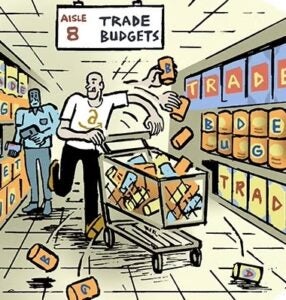“Data-Driven Thinking” is written by members of the media community and contains fresh ideas on the digital revolution in media.
Today’s column is written by Chris Simmance, managing director at Optus Digital.
Marketers must better understand how people will use voice. After years of training, consumers have become efficient text searchers – but that is about to change.
A text search via computer for a soundbar may yield great data, but marketers don’t fully know the user’s intent. Is there interest in buying one or getting one repaired? Or perhaps only an image was needed? That will change with voice search. As people learn to search in a much more human way, using conversational sentences, their intentions will become clearer.
Voice will change marketing approaches across every sector. One industry that will see dramatic changes is the consumer packaged goods (CPG) sector.
Once a stalwart of traditional marketing methods, groceries and supermarkets are now just as vulnerable as every other industry, because the connections between Alexa or Google Home and supermarkets’ home shopping services are changing. Voice search and ordering will affect the brands we buy and where we buy them from.
CPG brands work in a very basic way. They generate awareness and perhaps a bit of brand image, and that’s all. The consumer just needs a little nudge to complete the process. The brand rises to the top of people’s minds by advertising on TV or radio, and is there when that subconscious nudge is required in the supermarket or online.
Voice search will change all this. Consumers will not be in supermarkets looking for something to guide them – they may be in their homes when they realize they’ve run out of cheese to make their kids’ school lunch, shouting “Alexa, add cheese to my shopping list.” And there you have the biggest change for CPGs.
The newly voice-activated consumer is building their shopping needs over many days, and the brand may no longer play a role. Alexa may search for brands on sale, or go for the store brand because that’s the user’s default setting.
What’s happening is that Alexa is making the choice for us – one less thing to worry about – which means that brands and CPG advertising will need to change.
Through Echo and Google Home, CPGs will have to adapt their mobile apps to accommodate users’ needs and habits. Apps and skills will need to be seamless, so that when users say, “Alexa, add milk to my list,” they will know what size and type before asking users to confirm. CPGs will also need to promote their apps to the user base properly to leverage this.
However, it doesn’t just end there.
Alexa and Google Home don’t worry about loyalty. They look for deals – if Tesco is cheaper this week, they’ll order from there; next week, they could well buy from Sainsbury’s if their prices are more competitive. We could see a release of apps from supermarkets to lock consumers in and get them using their voice tools to buy groceries.
None of this will happen overnight, but the technology is there and our shopping habits are changing, so it’s on its way. The big global brands need to think hard about this or risk another tech company taking over their patch.
Follow Optus Digital (@optus_digital) and AdExchanger (@adexchanger) on Twitter.













